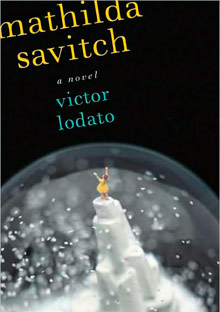Reading Questions for Mathilda Savitch
Warning: May contain spoilers

About this book: At the cusp of adolescence, Mathilda Savitch has a lot on her mind. The anniversary of her big sister's death is looming. Her parents live in a fog. She's curious about sex, but the guy she wants is more interested in her best friend. She also has to cope with a dangerous world, living in a community that is haunted by recent terrorism. Her solace lies in the strands of truth she is able to uncover about her sister, including the mysterious affair Helene was having just before she died. Hacking into Helene's e-mail account, Mathilda reads about a volatile relationship with an out-of-town man named Louis, who doesn't realize that his girlfriend is no longer alive. For the mischievous and still grief-stricken Mathilda, the temptation to impersonate Helene Michael Crouser online is impossible to resist—leading her to an underworld of raw truths and wry disillusionment.
Written in Mathilda's unflinching voice, this is a fiercely funny novel of life and loss, capturing the realities of adolescence in scenes that are by turns hilarious and heartbreaking.
— From the publisher
Read O 's review
Questions for Discussion
1. What was it like to read Mathilda's story in her own words, with phrases directed at you? Why does Mathilda sometimes lie to the reader? Do you think she is consciously manipulative, or do you believe she is lying to herself?
2. Reread the book's epigraph. Do you agree with G. K. Chesterton's statement that the desire for justice is related to innocence, while the desire for mercy is related to wickedness? How do Mathilda's feelings about justice and mercy evolve over the course of the book?
3. What makes Mathilda's friendship with Anna so unpredictable? Who was your best friend when you were their age? How was that relationship different from the friendships you have now?
4. What do you think lies behind Mathilda's desire to be "awful"? What does she seem to want? Do you sympathize with her? What were the most irrational thoughts you had as a teenager?
5. What does the current relationship between Ma and Da, combined with the legacy of their passionate younger days, teach Mathilda about love?
6. Mathilda has heard a lot about sex and has many beliefs about its power and pleasures. How does she want to use sex? What type of gratification is she looking for when she pursues Kevin? Discuss Mathilda's understanding of Helene's sexuality. In your opinion, how accurate are her perceptions about her sister?
7. Is Mathilda wise to stop trusting adults? What kind of role models are they in regard to dealing with her sister's death? Do you believe, as Mathilda states, that "Grief is an island"?
8. Why is it important for Mathilda to believe that Helene was pushed? What do you think lies behind Mathilda's brutal fantasies?
Written in Mathilda's unflinching voice, this is a fiercely funny novel of life and loss, capturing the realities of adolescence in scenes that are by turns hilarious and heartbreaking.
— From the publisher
Read O 's review
Questions for Discussion
1. What was it like to read Mathilda's story in her own words, with phrases directed at you? Why does Mathilda sometimes lie to the reader? Do you think she is consciously manipulative, or do you believe she is lying to herself?
2. Reread the book's epigraph. Do you agree with G. K. Chesterton's statement that the desire for justice is related to innocence, while the desire for mercy is related to wickedness? How do Mathilda's feelings about justice and mercy evolve over the course of the book?
3. What makes Mathilda's friendship with Anna so unpredictable? Who was your best friend when you were their age? How was that relationship different from the friendships you have now?
4. What do you think lies behind Mathilda's desire to be "awful"? What does she seem to want? Do you sympathize with her? What were the most irrational thoughts you had as a teenager?
5. What does the current relationship between Ma and Da, combined with the legacy of their passionate younger days, teach Mathilda about love?
6. Mathilda has heard a lot about sex and has many beliefs about its power and pleasures. How does she want to use sex? What type of gratification is she looking for when she pursues Kevin? Discuss Mathilda's understanding of Helene's sexuality. In your opinion, how accurate are her perceptions about her sister?
7. Is Mathilda wise to stop trusting adults? What kind of role models are they in regard to dealing with her sister's death? Do you believe, as Mathilda states, that "Grief is an island"?
8. Why is it important for Mathilda to believe that Helene was pushed? What do you think lies behind Mathilda's brutal fantasies?



